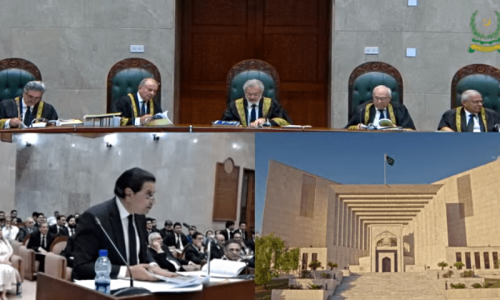• CJP says PTI didn’t lose symbol due to SC verdict, rather over its failure to hold intra-party polls
• Justice Minallah seeks update on complaints regarding poll irregularities
ISLAMABAD: As a Supreme Court judgement — that resulted in the PTI losing its election symbol over a failure to conduct intra-party polls — continued to come under fire during a full court hearing on the matter of reserved seats, Chief Justice Qazi Faez Isa took exception to what he termed “snide remarks” against the verdict, saying that whatever happened was PTI’s own doing.
The court was hearing a petition filed by the Sunni Ittehad Council (SIC) — which was joined by the PTI-backed independents — against a Peshawar High Court (PHC) decision to deny it reserved seats in the national and provincial assemblies.
“Repeatedly the judgement of the Supreme Court is being referred to,” CJP Isa observed and wondered whether the party ever held intra-party elections or not.
ECP counsel Sikandar Bashir Mohmand replied that the commission had no knowledge of any such elections, even today.
“One member (Justice Mussarrat Hilali) of the three-judge bench that gave the Jan 13 verdict had an open heart surgery and she is recuperating… so snide remarks against the judgement are not acceptable,” the CJP observed.
“If the review against the Jan 13 judgement is pending, then any bench should not discuss it as a matter of law, and if one still wants to make snide remarks, then please read the judgement first,” the top judge observed.
At this, Justice Athar Minallah said the legality of the judgement was not being questioned, but wondered whether the ECP ever informed the bench hearing the intra-party election case that such a decision would render the candidates of the particular political party without a unified election symbol.
Not holding intra-party elections by the party, the CJP reminded, was perpetual and he took exception to it.
He recalled how then-prime minister Imran Khan wrote to the ECP, seeking one more year to hold party elections, a request the commission eventually approved. According to the CJP, the PTI had 91 posts for different office-bearers, where all members were elected unopposed without even paying the required elections fee.
“Please quote from the judgement if someone wants to cite it,” he reiterated, adding that it was not enough to say that PTI was deprived of the election symbol because of the apex court judgement alone. The CJP wondered why the party was so rigid on its intra-party polls stance that “they are not even held today”.
“Why not file a petition before the court if you don’t want elections in the party,” he quipped.
Question of Section 240
Justice Munib Akhtar, however, asked why the ECP didn’t invoke Section 240 of the Elections Act 2017, which provided solutions to deal with difficulties faced by the commission.
Since a ‘common’ election symbol could not be given to a national political party which formed the federal government a mere two years ago, the ECP could have taken recourse to Section 240 by holding that the commission recognised the PTI as the enlisted political party. He said the ECP’s move “disenfranchised” the ex-ruling party in the Feb 8 elections.
At this, the CJP asked if there was any application submitted to this effect, to which the ECP lawyer said no.
Justice Minallah pointed out that the bench was confusing two things: one was the judgement of the court regarding the symbol, but the CJP interrupted again to reiterate that the judgement was regarding intra-party elections.
“There is a big distinction here,” he stressed.
Justice Muhammad Ali Mazhar, however, recalled that a review petition against the verdict was pending, wondering should that review be heard by the present bench now.
The counsel said there was a review pending but he was not the counsel in that case and couldn’t comment.
‘Effect’ of the judgement
In the present scenario, Justice Akhtar reiterated, a political party was unable to nominate its candidate and to give them the election symbol because of the Jan 13 judgement.
At this, the ECP counsel stressed that the commission was bound by the ruling.
Justice Akhtar further said the effect of the Supreme Court judgement in saying that PTI could not be allocated bat symbol was in fact to eliminate the PTI as a political party from the electoral fray in the general elections 2024.
The counsel, however, contested this, saying what he said was that a candidate in order to be treated nominated by a political party must give a declaration on oath that he belonged to a particular political party in addition to a party affiliation certificate and a common election symbol, which was not available to this political party.
“It is not a fair characterisation to say that it was done to eliminate a political party,” the counsel emphasised.
When Justice Akhtar wondered why this was the case, the CJP intervened again to defend the ruling, saying that before commenting on the judgement, one should at least read it.
Published in Dawn, June 26th, 2024













































Dear visitor, the comments section is undergoing an overhaul and will return soon.